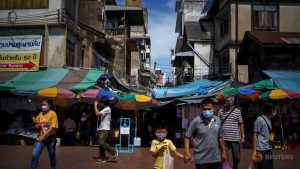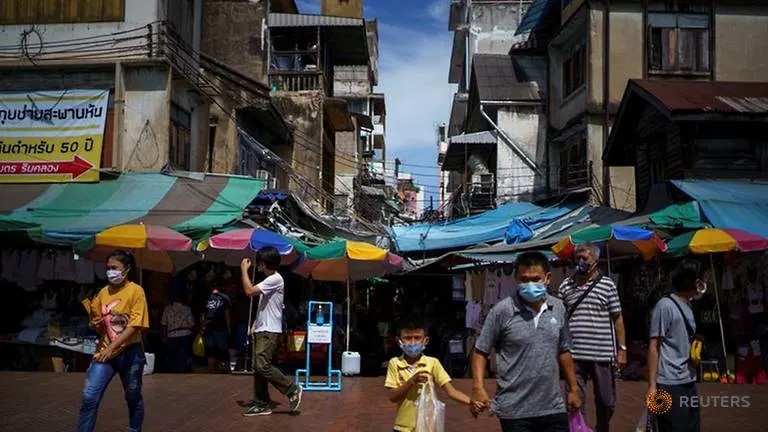
FILE PHOTO: People wearing face masks shop inside the Sampheng wholesale market as Thai government eases isolation measures, following the coronavirus disease (COVID-19) outbreak, in Bangkok, Thailand, June 10, 2020.
BANGKOK: The Thai government will lift a nationwide curfew next Monday (Jun 15) and allow alcohol sale to resume at restaurants and hotels, according to the Centre for COVID-19 Situation Administration (CCSA).
Its spokesperson Taweesin Visanuyothin said on Friday that more restrictions will ease from Monday onwards as the country continues to report zero new cases of local transmission.
Thailand recorded four new cases of COVID-19 on Friday, bringing the total to 3,129. The four – two Thai women and two Thai men aged between 37 and 53 – had come back from India and tested positive at a state quarantine facility in Chonburi province.
None of them exhibited symptoms related to the virus, according to Dr Taweesin.
“We have had no report of new cases from local transmission for 18 days now. Still, we shouldn’t let our guard down,” he said in a press conference at the Government House.
The country is entering the fourth phase of its reopening since lockdown was imposed in March. The curfew hours, which originally ran from 10pm to 4am since Apr 3, had earlier been shortened twice.
Despite the lifting of the curfew, Dr Taweesin said international arrivals to Thailand by air, land and sea will remain restricted until the end of the month, given that most of the recent new cases are imported.
“As for people in Thailand, you’ll be able to travel anytime without the curfew,” he added.
Besides ending the nationwide curfew, the Thai government will also allow international schools, educational institutes with international curriculum and tutorial schools to reopen on Monday. Small schools with no more than 120 students are also included in the relaxation.
According to Dr Taweesin, exhibitions, concerts, cinemas and sports competitions are among the activities allowed to resume with safety measures in place, along with spa and massage venues, childcare centres, and facilities providing support for children and the elderly.
Thailand is also considering “travel bubbles” for selected groups of foreign travellers as part of its efforts to recover the economy, the spokesperson added.
Discussions are taking place about health control measures and safe hospitality services to accommodate international visitors in the future. The first group of foreign travellers likely to be allowed to visit Thailand include businesspeople and medical tourists.
Countries and territories that could benefit from the reopening include China, Hong Kong, Macau, Taiwan, South Korea, Japan, Vietnam, Australia, New Zealand, Laos, Myanmar, Cambodia and some Middle Eastern countries, according to Dr Taweesin.
“The CCSA director has expressed his agreement in principle but sub-committees are needed to look into details and discuss different measures. This is to ensure public benefit and understanding,” he said.
The COVID-19 crisis has a profound impact on Thailand’s economy. In April, its central bank announced that the Thai GDP is expected to contract by 5.3 per cent this year – a significant cutback from the 2.8 per cent growth forecast in December 2019.
Last month, the Thai parliament approved three economic support schemes worth 1.9 trillion baht (US$61.45 billion) to soften the financial blow of health emergency. However, some have noted a lack of detailed information on the huge expenditure, saying that this raises questions about the schemes’ transparency as well as checks and balances.



